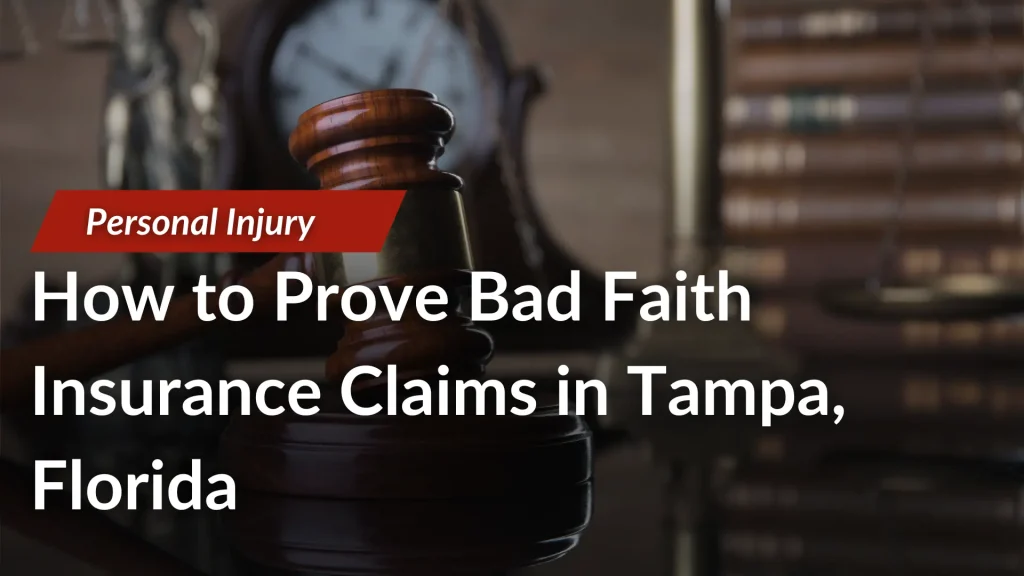
Policyholders expect their valid claims to be honored promptly and fairly when dealing with insurance companies in Tampa, Florida. Unfortunately, that doesn’t always happen. To prove bad faith insurance claims, you must understand the legal standards and provide solid evidence that an insurer acted unreasonably or unfairly in handling your claim.
What Constitutes Bad Faith in Insurance Claims?
Under Florida law, the duty of good faith and fair dealing is outlined in Section 624.155 of the Florida Statutes. Bad faith occurs when an insurance company fails to uphold its duty of good faith and fair dealing with its policyholders. This can include refusing to pay a valid claim, unreasonably delaying payment, or offering settlement amounts far below what is justified. The Florida Unfair Insurance Trade Practices Act sets clear guidelines for what constitutes bad faith, and knowing these standards is a key part of building your case.
Steps to Prove Bad Faith Insurance Claims in Tampa
To prove a bad faith insurance claim, you need to show that the insurer failed to meet its obligations under the policy and acted unfairly in the process. Here is how to approach it:
Understand Your Policy
Begin by reviewing your insurance contract closely. Understanding your coverage limits, exclusions, and the insurer’s responsibilities will help you pinpoint where they may have acted unfairly. Your policy is a legally binding agreement, and its language is crucial to understanding your rights and the insurer’s responsibilities.
Insurance policies often include fine print that can be confusing. Taking the time to fully grasp what you are entitled to can help you pinpoint any areas where the insurer’s actions might violate the terms of the agreement. If unsure, an attorney can help you analyze your policy and identify potential breaches.
Gather Evidence of Bad Faith
Keep all your interactions with the insurer—emails, letters, and call notes. Refusal letters, lowball settlement offers, or denial notices can help support your claim. Organize everything by date to show a clear timeline.
If the insurer’s actions caused extra costs, like out-of-pocket expenses from delayed payments, save those receipts. This proof shows the financial impact and helps build a stronger claim.
Identify Acts of Bad Faith
Examples of bad faith include:
- Denying a valid claim without a reason
- Not investigating a claim properly
- Delaying payment without cause
- Refusing to pay for losses that should be covered
- Unreasonably low settlement offers
- Misrepresenting the policy terms
If your insurer does any of these, it could strengthen your case. For instance, if they deny your claim but do not explain why, it is a red flag. Offering a lowball settlement can also show they’re trying to dodge their responsibilities.
Other signs that there may be some bad faith activity may include frequent changes in the insurance adjuster you’re dealing with, different interpretations of the policy depending on who you’re talking to, pressure to accept a speedy settlement, and sporadic communication.
Consult an Attorney
Bad faith insurance claims can be draining, but a lawyer can help you understand your options and feel supported. Look for someone with experience in Florida’s insurance laws and a strong track record in bad faith cases. The right attorney can help you build your case and deal with the insurance company, giving you peace of mind.
File a Civil Remedy Notice (CRN)
In Florida, you must file a Civil Remedy Notice (CRN) with the Department of Financial Services before suing. The CRN explains the insurer’s bad faith, gives them a chance to fix it, and needs to include details like what they did wrong, which policy terms they violated, and how you were harmed. Getting it right is key, and an attorney can help you make sure it is thorough and accurate to strengthen your case.
Pursue Legal Action
Litigation may be the next step if the insurer does not address the issue after you file a CRN. A lawsuit can push the insurer to pay for your losses, and in some cases, punitive damages might be awarded to punish their misconduct and prevent it from happening again. Your attorney will use evidence like witness statements, expert opinions, and documentation to show the insurer acted unreasonably and violated your policy.
Challenges in Bad Faith Insurance Cases
Proving an insurer acted in bad faith takes solid evidence and a clear understanding of insurance law since insurers often argue their actions were reasonable. They might claim the policyholder did not provide the necessary information or that the denial was based on valid policy exclusions. An attorney can help by gathering evidence, like expert testimony and records, to show the insurer acted unfairly. They’ll also anticipate and counter the insurer’s defenses, giving you a better shot at a successful outcome.
Why Proving Bad Faith is Important

Holding insurers accountable for bad faith practices helps you recover what you are owed and deters companies from engaging in similar conduct in the future. In Florida, successful bad faith claims can result in compensation for:
- The full value of your claim
- Additional damages that were caused by the insurer’s bad faith actions
- Attorney’s fees and court costs
- In some cases, punitive damages
Punitive damages in bad faith cases aren’t just about compensation—they’re a statement. A statement that unethical behavior won’t be tolerated. They also give policyholders the financial relief they deserve after being wronged by an insurer’s misconduct.
Seeking Legal Advice in Tampa
If you think your insurer is acting in bad faith, do not wait to take action. It is frustrating, but you do not have to settle. Getting legal advice early helps you understand your rights, make informed decisions, and feel supported. Start by gathering evidence and knowing your options. Do not let it slide if they deny your claim or offer less than what you are owed. You need a Tampa personal injury lawyer who can hold them accountable. Call Jurewitz Law Group Injury & Accident Lawyers at (619) 233-5020 or contact us online to set up a consultation. We are here to help, so you are not facing this alone.


